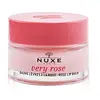What's inside
What's inside
 Key Ingredients
Key Ingredients

 Benefits
Benefits

 Concerns
Concerns

 Ingredients Side-by-side
Ingredients Side-by-side

Polyglyceryl-2 Isostearate/Dimer Dilinoleate Copolymer
EmollientPentaerythrityl Tetraisostearate
EmollientButyrospermum Parkii Butter
Skin ConditioningPrunus Domestica Seed Extract
EmollientRhus Succedanea Fruit Wax
Glyceryl Behenate
EmollientHelianthus Annuus Seed Wax
Skin ConditioningGarcinia Indica Seed Butter
Skin ConditioningMangifera Indica Seed Butter
Skin ConditioningSimmondsia Chinensis Seed Oil
EmollientLupinus Albus Seed Oil
Skin ConditioningTriticum Vulgare Germ Oil Unsaponifiables
EmollientAmmonium Glycyrrhizate
MaskingBisabolol
MaskingPadina Pavonica Thallus Extract
Skin ConditioningPolyglyceryl-3 Diisostearate
EmulsifyingPentaerythrityl Tetra-Di-T-Butyl Hydroxyhydrocinnamate
AntioxidantAscorbyl Palmitate
AntioxidantTocopherol
AntioxidantBenzyl Benzoate
AntimicrobialPolyglyceryl-2 Isostearate/Dimer Dilinoleate Copolymer, Pentaerythrityl Tetraisostearate, Butyrospermum Parkii Butter, Prunus Domestica Seed Extract, Rhus Succedanea Fruit Wax, Glyceryl Behenate, Helianthus Annuus Seed Wax, Garcinia Indica Seed Butter, Mangifera Indica Seed Butter, Simmondsia Chinensis Seed Oil, Lupinus Albus Seed Oil, Triticum Vulgare Germ Oil Unsaponifiables, Ammonium Glycyrrhizate, Bisabolol, Padina Pavonica Thallus Extract, Polyglyceryl-3 Diisostearate, Pentaerythrityl Tetra-Di-T-Butyl Hydroxyhydrocinnamate, Ascorbyl Palmitate, Tocopherol, Benzyl Benzoate
Helianthus Annuus Seed Oil
EmollientButyrospermum Parkii Butter
Skin ConditioningCera Alba
EmollientC10-18 Triglycerides
EmollientCaprylic/Capric Triglyceride
MaskingParfum
MaskingOleic/Linoleic/Linolenic Polyglycerides
EmollientTocopherol
AntioxidantGlyceryl Caprylate
EmollientRosa Centifolia Flower Extract
AstringentLithospermum Erythrorhizon Root Extract
Skin ConditioningSimmondsia Chinensis Seed Oil
EmollientCitric Acid
BufferingBenzyl Benzoate
AntimicrobialIsoeugenol
PerfumingHelianthus Annuus Seed Oil, Butyrospermum Parkii Butter, Cera Alba, C10-18 Triglycerides, Caprylic/Capric Triglyceride, Parfum, Oleic/Linoleic/Linolenic Polyglycerides, Tocopherol, Glyceryl Caprylate, Rosa Centifolia Flower Extract, Lithospermum Erythrorhizon Root Extract, Simmondsia Chinensis Seed Oil, Citric Acid, Benzyl Benzoate, Isoeugenol
 Reviews
Reviews

Alternatives
Ingredients Explained
These ingredients are found in both products.
Ingredients higher up in an ingredient list are typically present in a larger amount.
Benzyl Benzoate is usually created from the condensation of benzoic acid and benzyl alcohol. It is used as a preservative, solvent, and has a floral/balsamic scent in large amounts.
As a preservative, Benzyl Benzoate works against bacteria and fungus. It is often used to treat scabies and lice in medicine.
Solvents are used to keep ingredients together in a product. They can help dissolve ingredients to stable bases or help evenly distribute ingredients throughout the product.
Due to its fragrance, Benzyl Benzoate can be sensitizing and may cause contact dermatitis. It is a known EU allergen. We recommend speaking with a professional if you have any concerns.
Benzyl Benzoate can be naturally found in cranberries and peaches.
Learn more about Benzyl BenzoateThis ingredient is also known as shea butter. It is an effective skin hydrator and emollient.
Emollients help soothe and soften your skin. It does this by creating a protective film on your skin. This barrier helps trap moisture and keeps your skin hydrated. Emollients may be effective at treating dry or itchy skin.
Shea butter is rich in antioxidants. Antioxidants help fight free-radicals, or molecules that may harm the body. It is also full of fatty acids including stearic acid and linoleic acid. These acids help replenish the skin and keep skin moisturized.
While Shea Butter has an SPF rating of about 3-4, it is not a sunscreen replacement.
Shea butter may not be fungal acne safe. We recommend speaking with a professional if you have any concerns.
Learn more about Butyrospermum Parkii ButterThis oil comes from the seeds of the desert shrub called Jojoba. It is more commonly known as jojoba oil, a non-comedogenic oil.
Jojoba oil does not contain fragrance and has many fatty-acids, making it a great soothing ingredient.
It also contains Vitamin E, a great moisturizing ingredient. Vitamin E is also an antioxidant and protects your skin against oxidative damage.
This ingredient humectant properties, meaning it helps draw moisture from the air. This helps keep your skin hydrated.
While jojoba has antibacterial properties, it is only able to kill some strains of bacteria.
Studies also show it helps in wound healing. In fact, Indigenous cultures have used jojoba as a moisturizer and to help treat burns for centuries.
Fun fact: Jojoba oil similar to natural human skin sebum, so it has a great effect on dry skin. It is also promising with helping to regulate sebum production.
Due to its fatty acid content, Jojoba oil may not be fungal acne safe. We recommend speaking with a professional if you have any concerns.
Learn more about Simmondsia Chinensis Seed OilTocopherol (also known as Vitamin E) is a common antioxidant used to help protect the skin from free-radicals and strengthen the skin barrier. It's also fat soluble - this means our skin is great at absorbing it.
Vitamin E also helps keep your natural skin lipids healthy. Your lipid skin barrier naturally consists of lipids, ceramides, and fatty acids. Vitamin E offers extra protection for your skin’s lipid barrier, keeping your skin healthy and nourished.
Another benefit is a bit of UV protection. Vitamin E helps reduce the damage caused by UVB rays. (It should not replace your sunscreen). Combining it with Vitamin C can decrease sunburned cells and hyperpigmentation after UV exposure.
You might have noticed Vitamin E + C often paired together. This is because it is great at stabilizing Vitamin C. Using the two together helps increase the effectiveness of both ingredients.
There are often claims that Vitamin E can reduce/prevent scarring, but these claims haven't been confirmed by scientific research.
Learn more about Tocopherol